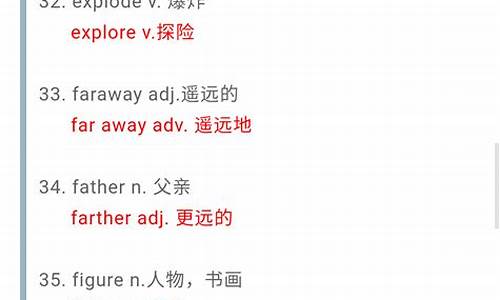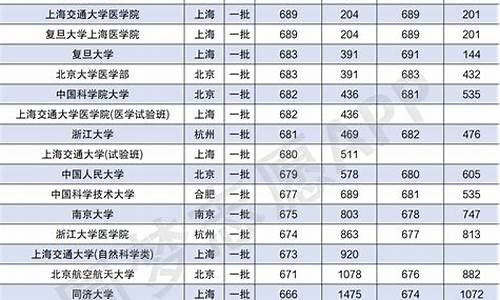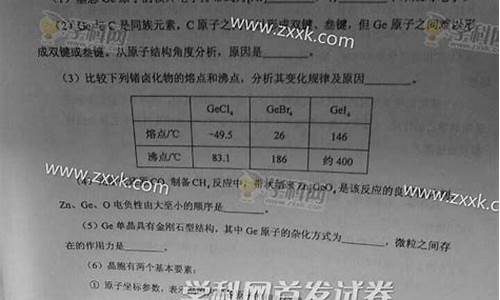您现在的位置是: 首页 > 分数线 分数线
高考英语词汇难,高考易混的英语
tamoadmin 2024-06-24 人已围观
简介1.3道高中英语易混的选择题2.高中易混英语短语3.高考英语易错易混词汇:Obsolete4.英语高考易混淆反义词?every、each:every作定语,each作定语或者名词性成分good形容词,well副词,形容词为“健康”except除……之外,besides除……还有haveto不得不must主观的必须3道高中英语易混的选择题1 quilt 被子 quiet 安静的 quit 停止
1.3道高中英语易混的选择题
2.高中易混英语短语
3.高考英语易错易混词汇:Obsolete
4.英语高考易混淆反义词?

every、each:every作定语,each作定语或者名词性成分
good
形容词,well
副词,形容词为“健康”
except除……之外,besides除……还有
have
to
不得不
must
主观的必须
3道高中英语易混的选择题
1 quilt 被子 quiet 安静的 quit 停止 quite 表示程度相当高
2 abroad国外 broad宽广的
3 dunk浸泡 duck鸭子
4 weak虚弱的 week周
5 meal 一顿饭 meat 肉
6 bother打扰 brother兄弟
7 world世界 word 词
8 sick生病的 thick厚的
9 month月 math数学
其实有很多,一下子想不起来太多
高中易混英语短语
1. C.
此题中的see是引申用法,翻译为“见证”,可以用witness来代替。
时态由the year 2002可以看出,为一般过去时。
2. D
主句为一般现在时,所以该主语从句该用什么时态就用什么时态,不受主句时态的影响。
B has been是现在完成时,意思是“截止到现在60年”,与史实不符。爱迪生他老人家已经过去N(N>60)年了;
D had been更不对了。连个做对比的的过去时间/动作都没有,何谈什么过去完成时即“过去的过去”呢?
A would be是过去将来时,是指“在过去的某个时刻对其后动作的预计”,那本书肯定是天书,能做这么准的预测,不妥;
所以只能选D,直接描述“过去的时间中的某个60年内(其实是指他由生到死的那个时段)的情况”。
3. B
此题解释同上题。
A was playing为过去进行时,但是不能说“过去很多年中他正在定期地踢足球”,明显句意不通顺;
C has played为现在完成时,强调截止到现在,但是后句明明有when he was yong.
D had played为过去完成时,指“过去发生的某个动作/过去某时刻之前发生的动作”,即“过去的过去”,但是该题没有可以作为参照物的过去动作/时刻。
所以,答案同样选B,只是单纯描述过去某时段内发生的动作,用一般过去时。
高考英语易错易混词汇:Obsolete
I don't think you will still have problem after you read the following examples.
Please make your own sentences, you will remember them well.
good luck!!!!!!!
He is in charge of the operation of the steel mill.?
他负责这家钢厂的经营工作。
I am in charge of financial affairs.?
我职掌财务。
I'm in charge of the Marketing Department.?
我是负责掌管市场部的。
The bus was in the charge of the driver.
这辆公共汽车由这位司机管理。
This kindergarten is in the charge of a young girl.
这个幼儿园由一个年轻的姑娘负责。
I drove up in front of the house and honked.?
我将车开到屋子前面然后按喇叭。
The driver was ticketed for parking in front of a fire hydrant.?
那个司机因把车停在消防栓前而接到交通违规罚单。
He stood in front of the shop with arms akimbo.?
他两手叉腰,站在铺子前。
There is a rose bush in front of the office.?
办公室前有一丛玫瑰。
She curled up in front of the fire with a book.?
她蜷曲在炉火前看书。
I prefer to travel in the front of the car.?
我愿意坐在汽车的前面。
The blackboard is in the front of the classroom.?
黑板在教室的前面。
I'll be sitting in the 3rd carriage from the front of the train.?
我将坐在第三节车厢。
The first-class compartments are in the front of the train.?
头等车室在列车的前面。
英语高考易混淆反义词?
Obsolete
What you think it means: Old, out of date。你以为单词的含义是:旧的,过时的。
What it really means: Not produced, used, or needed。单词的真正含义是:未生产的,未使用的,不需要的。
You’ll see this one in the tech industry a lot. People in tech article comments will comment that a phone is obsolete when they really mean that it’s out of date. The literal definition of obsolete is an item that it isn’t produced, needed, or used anymore. An example of this is is the steam engine. It’s largely inefficient compared to today’s combustion engine and even more inefficient than the emerging electric engines. Thus, steam engines are not used, produced, or needed anymore. Yes, they are also old and out of date, but obsolete is kind of the next step after old and out of date。
这个单词在科技行业经常出现。在科技文章评论中,人们会说某个电话机obsolete(未使用的),其实他们是想说电话机过时了。Obsolete的字面定义是指某物未被生产、不被需要或不再使用。一个例子就是蒸汽机。跟如今的内燃机相比,蒸汽机相当不给力,甚至都比不上新兴的电发动机;因此,蒸汽机是不被使用的、不被生产的或不再被需要的。没错,蒸汽机也是旧的、过时的,但obsolete是“旧”与“过时”更后一步的阶段了。
(来源:新东方在
draft是什么意思及反义词
draft 英[drɑ:ft] 美[dr?ft]
n. 汇票; 草稿; 选派; (小股)气流(尤指房间、烟囱、炉子等供暖系统中的);
vt. 起草; 制定; 征募;
vi. 拟稿; 绘样; 作草图;
全部释义>>
[例句]They later burned copies of the draft legislation in protest.
他们后来烧毁了草案的复印件以示 *** 。
更多例句>>
复数:drafts过去式:drafted现在分词:drafting过去分词:drafted第三人称单数:drafts
易混淆单词: DraftDRAFT
初中易混词组单词和重要词组单词(中考用)
初中英语容易混淆单词/词组
从近年来的中考题可以看出命题者的目的都是要考查学生对一些较易混淆、形式上非常相近的词(词组)是否能掌握扎实,是否熟悉每个词组的中文意思并能在句子中熟练运用。要想做对以上出现的类似的中考考题,考生必须能总结清各种初中阶段所学过的较易混淆、形式上非常相近的词(词组),熟记所有词组的中文意思,熟悉它们的用法和区别。为了方便同学们复习,特将常考易混词(词组)整理如下:
一、容易混淆的动词:
[考试说明] 了解及物动词和不及物动词用法;掌握动词不定式作宾语、宾语补足语、状语以及疑问词连用构成不定式短语的基本用法;理解动词不定式作主语和定语的用法;初步掌握延续性动词和瞬间动词在用法上的区别等。
1. e & be here
[误] He has e here for three hours.
[正] He came here three hours ago.
[正] He has been here for three hours.
e是瞬间动词,不是延续性动词,在肯定句中不能与表示一段时间的状语连用。而要与表示一段时间的状语连用,就要用延续动词。 与此同类的还有borrow/lend-keep; join-be in/at; die-be dead; buy-have; leave-be away,etc.
2. cost & take & spend & pay
[误] I cost a lot of time to read stories.
[正] It cost me a lot of time to read stories.
[正] I spent a lot of time reading stories.
cost除了钱的花费以外,还能表示时间上的花费,但常用物做主语。spend句子主语是人,可指花费时间和金钱,但后面的动词要用-ing形式,后面也可跟名词短语,介词用on。pay句子主语是人,常与for连用,buy也常与for连用,但花费“钱”要放在介词for后面,而pay则放在介词for前面。
3. join & take part in
[误] He joined the League for two years.
[正] He joined the League two years ago.
[正] He has been in the League for two years.
[正] He has been a League member for two years.
join指“参加”组织,成为一个成员,join *** .意思是“加入某人”,take part in指参加活动特别是大的运动;如指“参加…多长时间”就要用延续动词be in或be a …member,而不能用join。
4. borrow & lend & keep
[误] She has lent me the book for a week.
[正] She lent me the book a week ago.
[正] It’s a week since she lent me the book.
borrow和lend是短暂性动词,在肯定句里不和表示一段时间的状语连用,keep延续动词,可与表示一段时间的状语连用。 borrow意思是“借(进)”,后面跟介词from,lend意思是“借(出)”,后面......
上一篇:高考三卷试题,高考三卷试题分析









